RBSE Class 7 English Vocabulary Number
Rajasthan Board RBSE Solutions for Class 7 English Vocabulary Number Textbook Exercise Questions and Answers.
RBSE Class 7 English Vocabulary Number
आशय-Noun (संज्ञा) का रूप जो उस Noun के एक अथवा एक से अधिक होने का ज्ञान कराता हैNumber (वचन) कहलाता है। प्रकार-अंग्रेजी में Number (वचन) निम्न दो प्रकार के होते हैं -
1. Singular Number - जब कोई Noun केवल एक व्यक्ति अथवा एक वस्तु अथवा एक स्थान का बोध कराता है तो उसे Singular Number
(एकवचन) कहते हैं, जैसे-boy, girl, man (एक व्यक्ति ); chair, book, tree (एक वस्तु); city, village, school (एक स्थान)।

2. Plural Number-जब कोई Noun एक से अधिक व्यक्तियों अथवा वस्तुओं अथवा स्थानों का बोध कराता है तो उसे Plural Number (बहुवचन) कहते हैं, जैसे -
boys, girls, men; chairs, books, trees; cities, villages, schools आदि।
Golden Rules
निम्न नियमों की सहायता से एकवचन से बहुवचन बनाये जा सकते हैं
Rule : 1 : Singular से Plural बनाने के लिए | Noun के अंत में प्रायः -5 जोड़ देने से Plural Number बन जाता है, जैसे Singular Plural
Book -- Books
Paper -- Papers
Rule : 2 : जिस Noun के अन्त में -s, -SS, - ch, -sh, अथवा x हो तो उस Noun के अन्त में - es जोड़ देने से Plural Number बन जाता है, जैसे
Bus -- Buses
Brush -- Brushes
Class -- Classes
Box -- Boxes
Rule : 3 : अधिकतर Nouns जिनके अन्त में - हो तो उनके अन्त में -es जोड़ देने से Plural Number बन जाता है, जैसे
Mango -- Mangoes
Buffalo -- Buffaloes

Rule: 4: जिस Noun के अन्त में -y हो और उसके पहले कोई Consonant हो तो-y को हटाकर -ies जोड़ देने से Plural Number बन जाता है, जैसे
Army -- Armies
Lady -- Ladies
Rule 5: जिस Noun के अन्त में -y हो और - y के पहले कोई Vowel हो तो अन्त में -s लगा देने से Plural Number बन जाता है, जैसे
Boy -- Boys
Key -- Keys
Essay -- Essays
Rule: 6: जिन Nouns के अन्त में -f अथवा - fe हो तो इन्हें Plural बनाने के लिए
(i) -f अथवा -fe को हटा दो,
(ii) इनके स्थान पर -ves लगा दो।
Thief -- Thieves
Calf -- Calves
Wolf -- Wolves
Rule : 7 : अपवाद : कुछ शब्दों के अन्त में -f अथवा -fe होते हुए भी Plural बनाने के लिए-s लगता है, -ves नहीं लगता है, जैसे -
Chief (मुखिया) -- Chiefs
Roof (छत) -- Roofs.
Rule : 8 : कुछ Nouns के अन्दर का Vowel बदलने से Plural बन जाता है, जैसे
Man -- Men
Tooth -- Teeth
Rule : 9 : कुछ शब्द ऐसे हैं जिनके अन्त में -Ten लगाने से Plural बनता है, तथा कुछ शब्द ऐसे हैं जिनके अन्त में -en लगाने से Plural बनता है, जैसे
Child -- Children
Ox -- Oxen
Rule : 10 : यदि दो शब्दों से मिलकर कोई Compound शब्द बनता है तो दूसरे शब्द का ही Plural बनाते हैं, जैसे -
grand-father (दादा) -- grand-fathers
step-son (सौतेला पुत्र) -- step-sons
step-sister (सौतेली बहिन) -- step-sisters
Rule : 11 : कुछ Nouns का Singular तथा Plural में समान रूप रहता है, जैसे
Deer (हिरन) -- Deer
Sheep (भेड़) -- Sheep
Dozen (दर्जन) -- Dozen
Rule : 12 : Pronouns : इनके Singular-Plural निम्न प्रकार होते हैं
Singular -- Plural
I - we
She -- They
My -- our
Her -- Their
Me -- us
Herself -- Themselves
Myself -- Ourselves
It -- They
He -- They
Itself -- Themselves
His -- Their
This -- These
Himself -- Themselves
That -- Those
Yourself -- Yourselves

Rule : 13 : Verbs: इनके Singular-Plural निम्न प्रकार होते हैं --
Singular -- Plural
Is -- are
was -- were
has -- have
आपकी Textbook में प्रयुक्त प्रमुख शब्दों के Plural
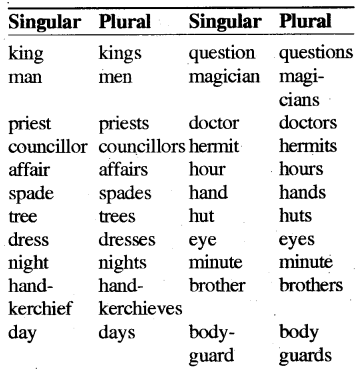
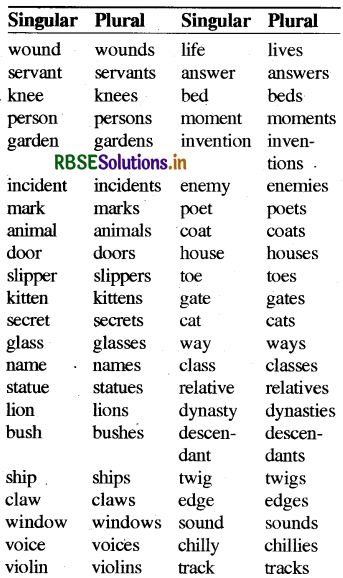
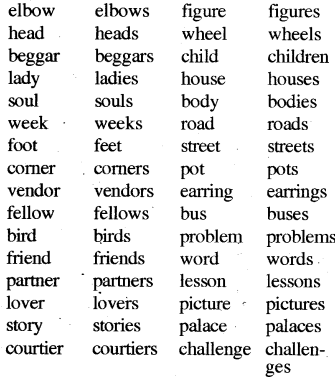

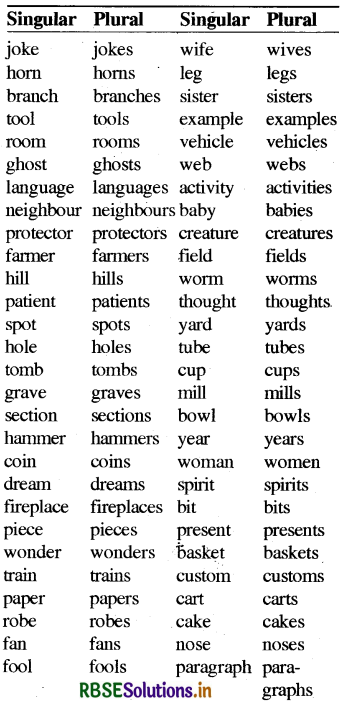
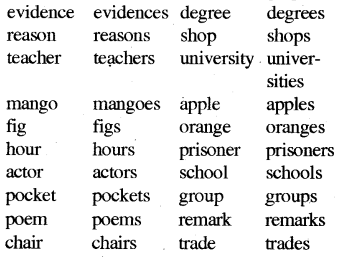
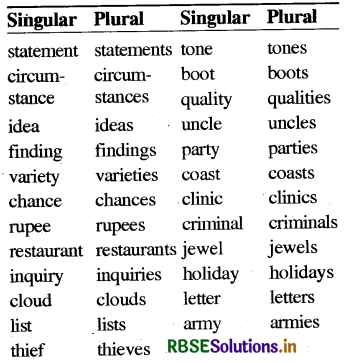

अन्य मह्तवपूर्ण शब्दों के Plural
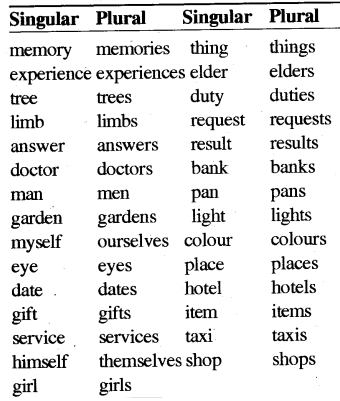
Exercise - 1.
Write the plural of the following words:
निम्नलिखित शब्दों के बहुवचन लिखिए :
1. story
2. memory
3. thing
4. child
5. kite
6. friend
7. tree
8. postman
9. house
10. duty
11. service
12. letter
13. box
14. parcel
15. bicycle
16. message
17. pigeon
18. messenger
19. foot
20. horse

21. branch
22. country
23. van
24. mosquito
25. bus
26. ship
27. aeroplane
28. computer
29. village
30. wife
31. woman
32. cow
33. goat
34. hen
35. mango
36. orchard
37. rupee
38. egg
39. student
40. camel
41. ticket
42. family
43. son
44. frock

45. cage
46. chilly
47. sparrow
48. passenger
49. fee
50. prince
Answer:
1. stories
2. memories
3. things
4. children
5. kites
6. friends
7. trees
8. postmen
9. houses
10. duties
11. services
12. letters
13. boxes
14. parcels
15. bicycles
16. messages
17. pigeons
18. messengers

19. feet
20. horses
21. branches
22. countries
23. vans
24. mosquitoes
25. buses
26. ships
27. aeroplanes
28. computers
29. villages
30. wives
31. women
32. cows

33. goats
34. hens
35. mangoes
36. orchards
37. rupees
38. eggs
39. students
40. camels
41. tickets
42. families
43. sons
44. frocks
45. cages.
46. chillies
47. sparrows
48. passengers
49. fees
50. princes

Exercise-2.
Fill in the blanks with plural of the words given in brackets :
कोष्ठकों में दिए गए शब्दों के बहुवचन से रिक्त स्थानों की पूर्ति कीजिए :
1. It expanded the audience for the game by beaming cricket into small (town)
2. His .............. were pressed against his tomach. (hand)
3. I should have died if you had not dressed my ................ (wound)
4. He not only forgave him but said he would send his ................. and his own doctor to look after him. (servant)
5. I beg you to answer my ............. wise man. (question)
6. The marks for the two big ............were long and scrawny. (toe)
7. And you know what the emblem of the ancient Pallava ................. was, don't you? .......... (king)
8. He tipped a few .................. over himself......... (chilly)
9. The rebel dresses in fantastic .............. (cloth)
10. Having no ................., they loved it as though it were a baby. (child)
11. The wind blew the dust in the ............ and eyes of the dramio and his wife. (nose)
12. Don't drag your ............ (foot)
13. And I was not able to go to him for nearly two (year)
14. Trees are for .................. (bird)
15. Trees are to have tea ............ under. (party)
Answers:
1. towns
2. hands
3. wounds
4. servants
5. questions
6. toes
7. kings
8. chillies
9. clothes
10. children
11. noses
12. feet
13. years
14. birds
15. parties.
